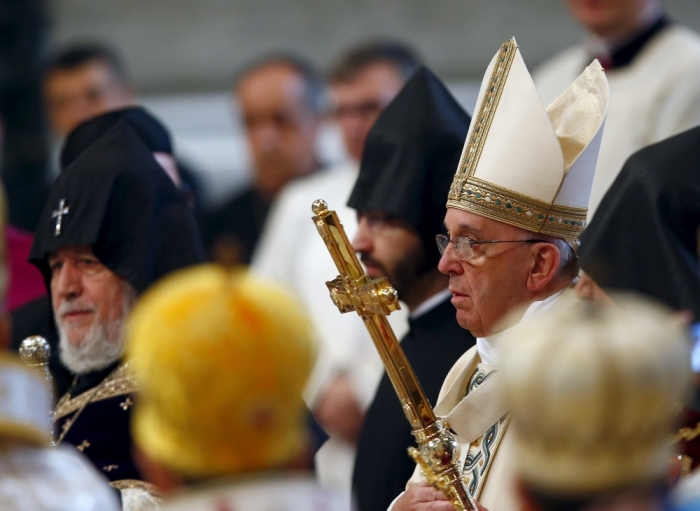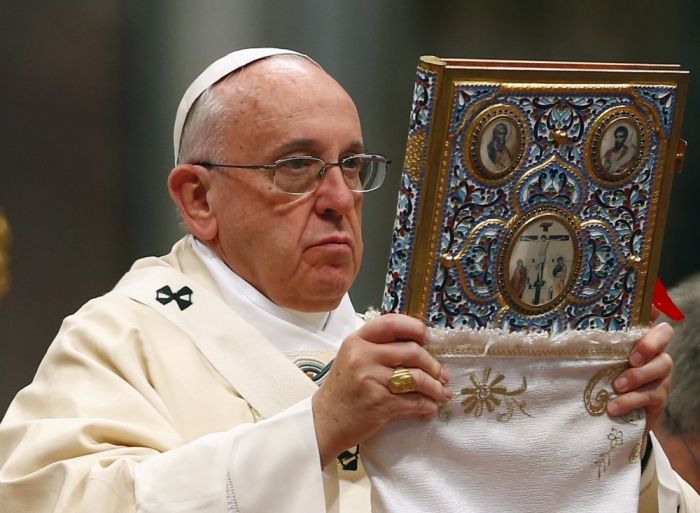Turkey Recalls Ambassador to Vatican in Anger Over Pope Francis Acknowledging Genocide of 1.5 Million Armenian Christians

Turkey has recalled its ambassador to the Vatican in protest over Pope Francis using the word "genocide" to describe the mass killing of 1.5 million Armenian Christians at the hands of the Ottoman Empire 100 years ago.
Turkey's Foreign Minister Mevlut Cavusoglu said that Francis' use of the word was "unacceptable" and "out of touch with both historical facts and legal basis."
"Religious offices are not places through which hatred and animosity are fueled by unfounded allegations," Cavusoglu added in a Tweet.
The response follows the pontiff's speech on Sunday at St. Peter's Basilica to commemorate the 100th anniversary of the Armenian massacre.
Vatican Radio reported that beside using the word "genocide," Pope Francis "noted three 'massive and unprecedented tragedies' of the 20th century, the first of which was the 'Great Crime,' the systematic massacre of Armenian Christians who were slaughtered because of their faith. The atrocities of the Nazis and the Communists, along with other mass killings, makes it seem as if 'humanity is incapable of putting a halt to the shedding of innocent blood. … We have not yet learned,' he said, that 'war is madness,' a 'senseless slaughter.'"
Armenia and others in the international community maintain that up to 1.5 million people, mostly Christians, died between 1915-'16 at the hands of the Ottoman Empire, which less than a decade later disintegrated into present day Turkey.
The Turkish government argues that a much smaller number of people died, and blames the deaths not on ethnic or religious cleansing but on various clashes during World War I.
Turkey's former ambassador to the Vatican, Kenan Gursoy, clarified, however, that the government's decision to recall the present ambassador for consultations does not mean the country's relationship with the Vatican has suffered irreversible harm.
"This does not mean that our diplomatic ties with the Vatican are over," Gursoy told CNN.
"Since this is a situation that we do not approve of, as a first reaction, (the ambassador) is summoned to get consultation," he added, arguing that the word "genocide" is a "one-sided evaluation."
Armenian Foreign Minister Edward Nalbandian responded to Turkey's protest by stating that the two countries understand history very differently.
"We are in a situation in which Turkey speaks a different language from the rest of the international community and it seems that it doesn't understand that it is speaking a different language," Nalbandian told Italian News Agency Adnkronos.
"During these past days there have been several international organizations that adopt resolutions or issue statements that recognize the Armenian genocide and that appeal to Turkey to make this step," he added.
"The pope's statement are in this context of universal value. When Turkey is able to understand this, it will be able to understand what the International community and big personalities (or better translations 'leaders') are saying."
Armenian and Syrian Orthodox Patriarchs have asked Christians to remember the victims of the genocide a century ago.
"We invite the entire Christian world to unite in prayer at the Armenian Genocide and the Syriac Sayfo centennial commemorative events in 2015. We call upon the civilized world to recognize and condemn the crimes committed against the Armenian and Syriac peoples as well as other Christian communities," read the joint statement last year by the Supreme Patriarch and Catholicos of all Armenians, Karekin II, and the Syriac Orthodox Patriarch of Antioch, Mar Ignatius Aphrem II.





























